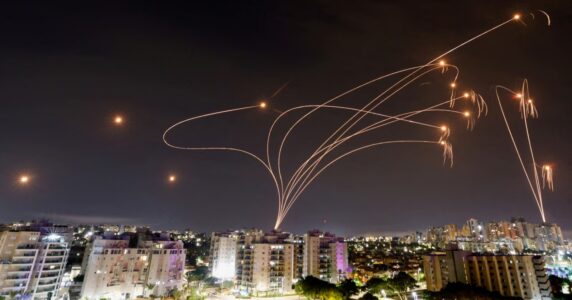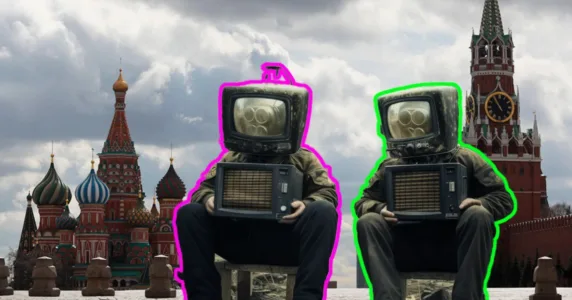Navigation and useful materials
The Kremlin has sharply stepped up imperial rhetoric, and Shoigu’s “formidable” office fears questions from ordinary Russians. The Centre for Strategic Communication and Information Security has collected the main fakes and narratives of the Russian propaganda of June 9.
- The sad adventures of captive foreigners in the Russian anti-utopia
- Another imperial fever in the Kremlin
- Russians complain en masse about Shoigu
- Foreign “Irony” of the Russian special forces
The sad adventures of captive foreigners in the Russian anti-utopia
Russian propaganda has long been preparing its audience to expose foreign mercenaries in the ranks of the Azov Regiment in Mariupol. Now that the remnants of the Mariupol garrison are in Russian captivity, it’s time to put their money where their mouth is.
And the propaganda responded by the trial over the Moroccan Saadun Brahim and British citizens Sean Pinner and Aiden Aslin in Donetsk. On June 9, all three were sentenced to death under the articles “mercenary work” and “forcible seizure of power or forcible retention of power” of the so-called “Criminal Code of the DPR.”
They are actually captured Ukrainian servicemen (not mercenaries), but from the 36th Separate Marine Brigade. Apparently, they failed to find “foreign mercenaries” in the Azov Regiment itself.
Unfamiliar with the realities of Putinism, compatriots of the doomed soldiers probably regret that they were taken prisoner by the “People’s Militia of the DPR” and not by the Russian Armed Forces. In Russia itself, death penalty has been banned since 1997.
But not everybody knows that Russia is rapidly turning into a dystopian country. And the dystopian features it acquires are not just from the tragic novels like Orwell’s 1984, but also grotesque ones. Like the Moscow 2042 novel by dissident writer Vladimir Voynovich.
The story with death sentences in the puppet “DPR” are literally copied from Voynovich’s book. In his fictional anti-utopia, the death penalty is forever abolished. Instead, what is widely practised is exile to a location where capital punishment is still practised.
IN REALITY, a death sentence (basically blackmail by murder) means:
- satisfying the bloodthirsty attitudes of the audience that believes that the Anglo-Saxons are fighting against the “Russian World”;
- threat to other foreigners fighting on the Ukrainian side;
- inciting British public opinion against the decisive steps of Boris Johnson in support of Ukraine;
- terrorist trading in the lives of the prisoners — forcing the UK into establishing at least some kind of legal relationship with the unrecognized “DPR”.
Another imperial fever in the Kremlin
On June 9, speaking at an event announced as a “meeting with young entrepreneurs, engineers and scientists,” Putin compared himself to Peter I and expressed readiness to follow his example of imperial expansion.
“All things considered, we also have to recover and strengthen, and if we assume that these basic values are the basis of our existence, we will certainly succeed in handling the tasks before us,” he said.
IN REALITY, this whole personal megalomania is clearly aligned with actualization of the Kremlin’s imperial ambitions.
Here are some other manifestations of this course:
– Spreading information about plans to unite the “L/DPR” with the occupied territories of Kherson and Zaporizhia oblasts into one federal district within Russia.
– Pause in the process of annexation of the occupied Georgian South Ossetia (a referendum was already scheduled for July 17). Is Russia preparing to swallow everything seized from its neighbours in one go?
– A draft law on the withdrawal of the decision to recognize Lithuania’s independence by Russia (as a legal successor to the USSR). The idea is that after the adoption of this law, Lithuania will allegedly automatically become a “disputed territory” and therefore will not meet the criteria for NATO membership.
– “The territory of modern Russia has not shrunk forever compared to the size of the Russian Empire. Russia’s area will increase,” promised Medinsky, who is still chairman of Russia’s negotiating team with Ukraine.
– The head of the Russian Foreign Intelligence Service Naryshkin officially states that “Poland plans to return its ‘historical territory’ in Ukraine,” once again proposing “to divide Ukraine between the interested neighbouring countries.” Of course, Moscow considers the eastern and southern parts, together with Kyiv, to be its share of the booty.
– Deputy Chairman of the State Duma Committee on CIS Viktor Vodolatsky assures that “Transnistria de facto considers itself the territory of Russia and wants to repeat the path of the DPR, LPR and South Ossetia.”
All these are symptoms of a new exacerbation of imperial fever. We don’t know how long it will last. But Putin promised that “in 10 years, Russia will live better.” And this is the awkward moment when, feeling like Emperor Peter, you have to lie like Khrushchev. The one who promised in 1961 that “the next generation of Soviet people will live under communism.”
Russians complain en masse about Shoigu
On June 9, new reports from the Russian Defence Ministry and its propaganda staff about the victories of the Russian army in the “special operation in Ukraine” appeared.
By the way, the topic of glorifying special operation participants in pro-Kremlin telegram channels is among the key priorities, alongside discrediting the Armed Forces of Ukraine.
IN REALITY, on June 9, it turned out that Putin’s administration has already received 1.2 million complaints about Shoigu’s ministry in 2022. And since the beginning of the invasion of Ukraine, the flow of complaints has increased 6 times.
The peak of discontent came in April, when Russian soldiers took a break and were able to contact their families.
By the end of March, news of the deaths and captivity of numerous servicemen began to reach Russia. The grounds for complaints to the Ministry of Defence have also changed. Families of the military began to write to the Administration of the President about the unsatisfactory work of military enlistment offices, as well as to look for prisoners and missing persons.
Initially, these issues were addressed to military units and command, in vain. A striking example is the situation with the missing crew of the Moskva flagship. The command is still hiding the scale of the losses. People began to write to a higher level of government, and in April, the Putin administration received 41,666 complaints about the unsuccessful search for their loved ones.
“It is virtually impossible to find out about the missing. The longer they neglect the need to remove the bodies of our fallen servicemen, the worse it will be later. We will have to look for them for decades,” says secretary of the Union of Soldiers’ Mothers Committees of Russia Valentina Melnikova.
Russians are concerned about the work of military registration and enlistment offices (83.5 thousand complaints), conscription (78.9 thousand), contract service (75.6 thousand), payments to contract soldiers (67.7 thousand), the use of the Russian Armed Forces abroad (55.7 thousand), payments to veterans (41.7 thousand), as well as the search for prisoners and missing persons (41.7 thousand).
But there is hardly any point in hoping these complaints will be handled well. Since 2016, Russia’s MoD has responded positively to only 3% of appeals to the Putin administration.
Foreign “Irony” of the Russian special forces
And finally, something ironic about the “domestic products only.” The Russian army has a special forces intelligence complex, which is called “Irony”. It is a thermal imager for automatic detection of moving objects.
IN REALITY, the “Irony” of the Russian special forces consists entirely of foreign components:
- French thermal imager matrix ULIS PICO640;
- laser rangefinder DMC-SX 5000 of the Swiss company Vectronix;
- RT3070L wireless module from AliExpress;
- FPGA XILINX Spartan 6 (USA);
- on the disassembly video, you can see a chip of the California company Linear Technology (purchased by the Massachusetts company Analog Devices in 2017);
- all this works on Angstrom Linux (development stopped 5 years ago).
This is the ridiculous “Irony” of the Russian special forces. On the other hand, the irony with Russia in general is that they keep promising things and a better life, be it through “building communism” or “restoring the empire.” Meanwhile, Russians have to live in an anti-utopia that may seem ridiculous to the reader, but not to the characters.
If you have found a spelling error, please, notify us by selecting that text and pressing Ctrl+Enter.



